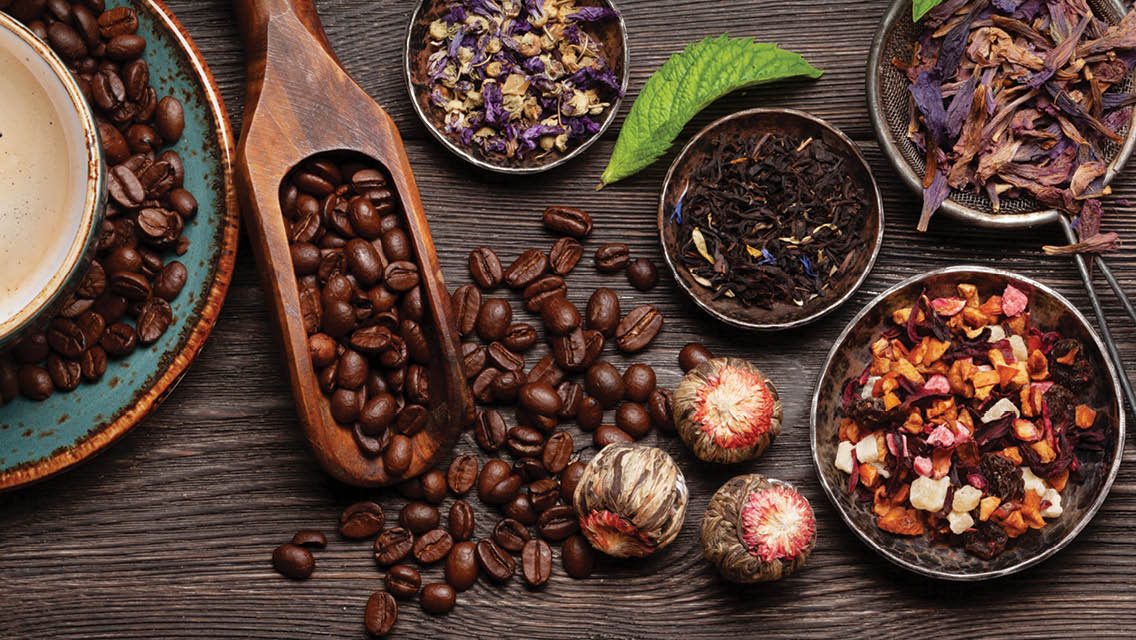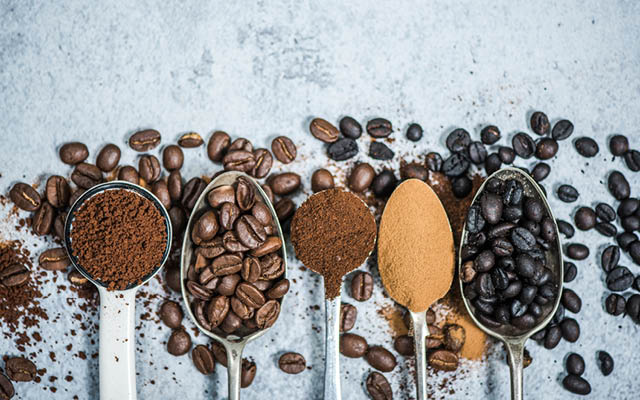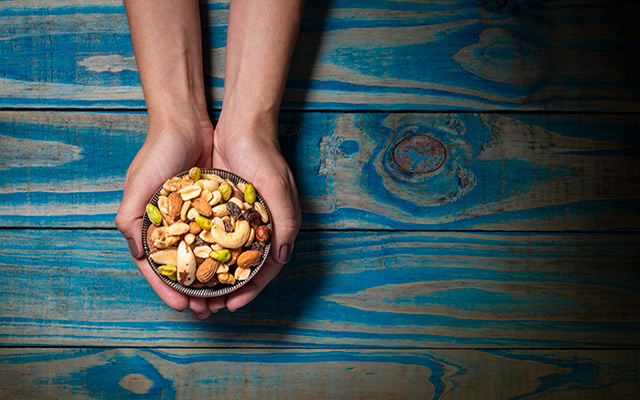Caffeine plays a starring role in most of our lives. Some two-thirds of American adults make coffee the bedrock of their morning routine, and some form of caffeine is consumed by eight out of 10 adults around the globe every day.
“Caffeine is the most widely used psychoactive drug in the world,” says integrative psychiatrist Henry Emmons, MD.
But what is it, really?
In its distilled form, caffeine is a bitter white powder that is breathtakingly powerful. A sixty-fourth of a teaspoon, roughly the amount found in most soft drinks, gives our central nervous systems a nice little buzz, notes journalist Murray Carpenter in Caffeinated: How Our Daily Habit Helps, Hurts, and Hooks Us.
A 12-ounce cup of coffee has about one-sixteenth of a teaspoon of caffeine, which gets the heart racing and the mind jumping a bit more. A quarter teaspoon will tip most of us into an overcaffeinated state: that sweaty, heart-racing inability to concentrate. And apparently, a full tablespoon can kill a person. Powerful stuff, indeed.
In Caffeine: How Coffee and Tea Created the Modern World, author Michael Pollan credits the brew served in 17th-century European coffeehouses with sharpening the mental focus of some of the best-known thinkers and philosophers. Caffeine also helped fuel the Industrial Revolution, he suggests, by sustaining workers during long, hard days of labor.
When American employers in the 1940s realized caffeine’s unparalleled power to boost worker productivity, they began to promote the coffee break. Some even mandated that workers take one because it boosted the bottom line. As anyone who has leaned on coffee to finish a project knows, it works.
Like many drugs, caffeine has both positive and negative effects, and our responses to it are highly individual. To understand the powerful spell of caffeine, and unravel its many mysteries, we dug into the research and asked functional-medicine experts to answer some niggling questions. We learned a lot.
1. What is caffeine?
Caffeine is a naturally occurring substance found in the leaves and seeds of certain plants, including, most famously, coffee beans, tea leaves, and cacao beans. Its scientific name is 1, 3, 7-trimethylxanthine, and it’s part of a family of compounds called xanthines, which are mild stimulants.
2. What does caffeine do in the body?
Caffeine shifts the central nervous system into high gear by raising heart rate, constricting blood vessels, and increasing blood pressure. It also sharpens thinking, “giving us a little bit of extra vigilance, focus, and intensity,” says Emmons. “It artificially puts us in a very mild fight-or-flight stress response.”
Caffeine blocks a neurotransmitter called adenosine, which tells the body when it’s tired. Adenosine accumulates in the bloodstream throughout the day; as it increases, we start to feel drowsy. When the clock strikes 9:30 p.m. and you start yawning and stretching, that’s the work of adenosine.
Without those adenosine signals, it can be a lot harder to fall asleep, which is why we’re often advised to quit caffeine by midday if we have a hard time falling — or staying — asleep.
3. What are the benefits of caffeine?
There are many. Caffeine helps boost concentration, focus, and memory. A double-blind study at Johns Hopkins published in 2014 found that participants who consumed caffeine after looking at a series of images were better at distinguishing those images from similar ones when tested on it the next day.
Caffeine can also improve mood regulation. “Studies show that caffeine may help reduce depression,” explains functional-medicine nutritionist Jesse Haas, CNS, LN. “And it has even been shown in a 2013 Harvard study to reduce suicide risk, probably because of its antidepressant properties.”
Haas notes that caffeine can also amplify the effect of pain-relieving medication, thanks to its ability to constrict blood vessels. “That’s why you find caffeine in many migraine medications.”
Studies have linked caffeinated-coffee consumption with reduced risk of liver cancer and cirrhosis. A Harvard study published in 2011 found that drinking coffee lowers the risk for a deadly form of prostate cancer.
Other research correlates coffee consumption with lower risk of developing type 2 diabetes, cardiovascular disease, and gallstones.
Consuming caffeine has direct effects on the gastrointestinal tract, too. Beverages like coffee and tea contain chemical compounds called methylxanthines that help increase bile flow and stomach acid. Caffeine also kickstarts peristalsis, which helps speed elimination. This may be why a cup of coffee is so appealing after a big meal.
Finally, the stimulating effects of caffeine have been shown to improve performance across a wide range of sports.
4. What are the drawbacks of consuming caffeine?
Caffeine notoriously inhibits good sleep, and for those who struggle with anxiety, caffeine can be public enemy No. 1. Data also suggests that caffeine may disrupt hormone balance, potentially interfering with fertility. It may increase discomfort and pain for those with acid reflux or ulcers. Plus, it’s notably addictive.
5. Why are some of us more sensitive to caffeine?
This may be genetic. Caffeine metabolism is influenced by two genes: CYP1A2 and AHR. CYP1A2 affects the body’s ability to break down and process certain substances, including caffeine. AHR helps regulate the CYP1A2 gene.
Commercially available genetic testing, like that from 23andMe, can identify the variants related to caffeine metabolism and provide some insight into your particular sensitivity. Still, most of us don’t really need a genetic test to tell us — we can usually feel its effects.
6. Is it healthier to avoid caffeine?
Because caffeine is processed by the body’s detox pathway, eschewing caffeine for short periods of time can decrease the liver’s detoxification burden, freeing it to usher other toxins through instead. This is one reason many elimination diets call for cutting out caffeine.
As for whether it’s better to quit caffeine forever, that depends on how it makes you feel. Many functional-medicine experts don’t see anything wrong with enjoying it in moderation.
“If you don’t have problems with sleep or anxiety, it’s not a problem to enjoy caffeine,” says Emmons. “Some people can drink coffee all day right up to bedtime and it doesn’t seem to affect sleep at all.”
The most important thing to consider is how caffeine affects you personally, he says. “My reading of the research is that it comes out mostly positive for caffeine. But if you’re experiencing anxiety, caffeine just adds fuel to the fire.”
Other experts take a more cautious view, and some advise abstaining altogether. Nutritionist Karen Hurd, MS, is concerned about associations between caffeine and infertility, poor sleep, and potential heart issues like tachycardia.
There’s also the dependency factor. “Caffeine will give you a boost, but it leaves you lower than it found you. Then you need more of it,” she says.
Caffeine’s potent effect on mood and energy is a good reminder that it’s an addictive drug. “When you drink caffeine regularly, you develop resistance and you need more over time to get the same zap,” says Hurd. “Instead of one cup of coffee to feel as energized as you once did, you now need to have two or three.”
Still, some experts say that if you’re tuned in to your body and consume caffeine in moderation, you don’t need to worry too much about caffeine’s addictive quality. Again, the answer depends on how caffeine affects you. Everyone is different.
7. How much caffeine — if any — is right for me?
Try avoiding caffeine for a couple of weeks to see how you feel. After you recover from any withdrawal symptoms, you might find that you feel better-rested when you are caffeine-free.
Adenosine, the neurotransmitter that promotes drowsiness, may also foster deep sleep: Without caffeine to block it, you may sleep more deeply and feel more rested and energized.
You may also notice a reduction in ambient anxiety, even if you didn’t think you were particularly jumpy before.
If you do feel better without caffeine, it doesn’t mean you have to quit it forever. You might just find a new, more moderate pattern. “Take it out, see how you feel, then reintroduce it and see how you feel,” says Haas. “Run an experiment, pay attention.”
As you reintroduce caffeine, increase the amount slowly. When a certain amount feels like too much, cut back. That’s your caffeine sweet spot. Then you can adjust as needed.
“If you go through a period of increased stress or have a lot of anxiety, it may make sense to gradually taper your caffeine intake,” says Emmons. “What’s happening at any given time in your life has a strong influence on how caffeine affects the nervous system.” At the end of a stressful period, you can return to your regular amount.
If you occasionally have an extra cup of coffee or tea to help you focus on a project or study for an exam, it’s unlikely to cause long-term harm. But be mindful of what type of project you’re working on before you pour yourself a first (or second) cup of coffee.
“Caffeine sharpens focus,” says Emmons. “But when you want to be creative and think outside the box, it might actually be best to have a broader focus, one that is not so sharp and pointed. In that case, caffeine might not be so helpful.”
8. Does diet affect caffeine metabolism?
As with environmental toxins, caffeine needs to be detoxified from the body. Because the detox pathways that caffeine travels require many phytonutrients to function, a high-phytonutrient diet may support better metabolism of caffeine than the standard American diet.
The fact that caffeine activates the detox pathway is less harmful than it sounds. “There are all these pathways in the body and the ones that are most traveled function the best,” says Haas. “Regular caffeine consumers keep the detox pathway stimulated and functioning efficiently, so when the body encounters things it needs to detox, it’s like, ‘I’ve got this!’”
The primarily good stress that caffeine places on the liver may explain why caffeine consumption has been linked with a reduced risk of liver cancer and cirrhosis.
In short, if you’re eating whole, organic, phytonutrient-rich plants, with plenty of high-quality proteins and fats, your body may have an easier time metabolizing caffeine. And if you make a practice of giving it up for a couple of weeks once or twice a year, you may reap some additional detox benefits.
9. Is there optimal timing for caffeine consumption?
The more important question may be, How do I optimize my sleep? For a better night’s sleep, it’s wise to keep your consumption to the morning hours.
Ninety-nine percent of the caffeine in a cup of coffee, tea, or other caffeinated drink is absorbed by the body within 45 minutes. Caffeine levels can be most concentrated in the bloodstream in as little as 15 minutes after consuming these beverages.
Still, for most healthy adults, it takes five hours for caffeine levels to decrease by half. At the 10-hour mark, most caffeine has moved through the body, though it can vary greatly depending on the person.
10. What is the best way to wean myself from caffeine?
This process can be difficult. Caffeine causes the blood vessels — including small capillaries in the brain — to constrict. When you quit caffeine, says Hurd, your blood vessels dilate, but the small capillaries in the brain don’t necessarily dilate evenly. This uneven vasodilation can create the pounding headache associated with caffeine withdrawal.
To avoid this misery, take your time. “Gradually taper off caffeine,” advises Emmons. Try drinking smaller cups of coffee or mixing your regular caffeinated brew with decaf. “Cut back slowly until your symptoms are gone or until you’re off caffeine.”
Haas also believes in a gradual approach. “There’s no reason to feel lousy,” she says. “If the only thing you had to do for three weeks is eliminate caffeine, then cool. But if you’re going to work and walking the dog and generally having responsibilities, feeling lousy isn’t very supportive of that.”
11. Does caffeine tolerance change as we age?
Yes, we may become more sensitive to caffeine due to shifts in our hormones and body composition. Caffeine may also be associated with lower levels of calcium in the body, which may impair bone health.
“As we get older, we tend to have less tolerance to substances such as caffeine,” says functional-medicine nutritionist Renata Shiloah, RD. “This does not happen to everyone, but on average, the body’s tolerance for caffeine decreases over time.”
If you’re worried that your tolerance for caffeine is decreasing, pay closer attention to how it is affecting your body, sleep, anxiety, and general mood — then adjust accordingly. Our bodies and their capacities are always changing.
“Use common sense,” says Shiloah. “You have to listen to your body.”
How Much Caffeine Is In That?
The amount of caffeine in coffee drinks, including decaf varieties, can vary greatly depending on how they’re made. Though it may seem stronger, a shot of espresso has less caffeine than a cup of brewed coffee. Black tea, meanwhile, has less caffeine than coffee, green tea has less caffeine than black tea, and chocolate has less than all of them.
This chart shows approximately how much caffeine is in some popular beverages and foods. Keep in mind that there will be a lot of variation in these numbers — light-roast coffee has considerably more caffeine than dark roast, for example.
| Food/Beverage | Serving Size | Amount of Caffeine |
| Dark chocolate | 1 ounce (about 1/3 bar) | 12 mg |
| Green tea | 12 ounces | 40–50 mg |
| Black tea | 12 ounces | 60–70 mg |
| Espresso | 1 ounce (one single shot) | 75 mg |
| Caffeinated soda | 12 ounces | 90–115 mg |
| Brewed coffee | 12 ounces | 150 mg |
| Energy drink | 8 ounces | 200–300 mg |
This article originally appeared as “Caffeine!” in the September 2021 issue of Experience Life.





This Post Has 0 Comments